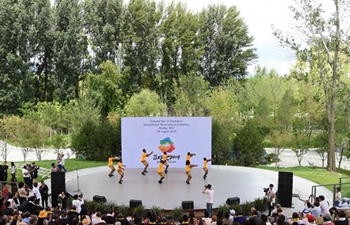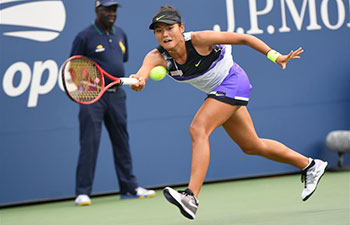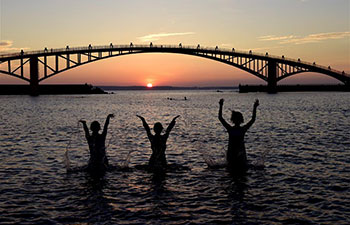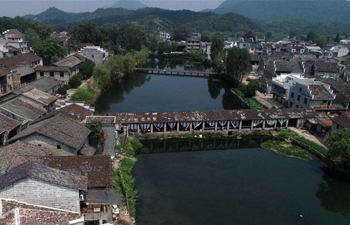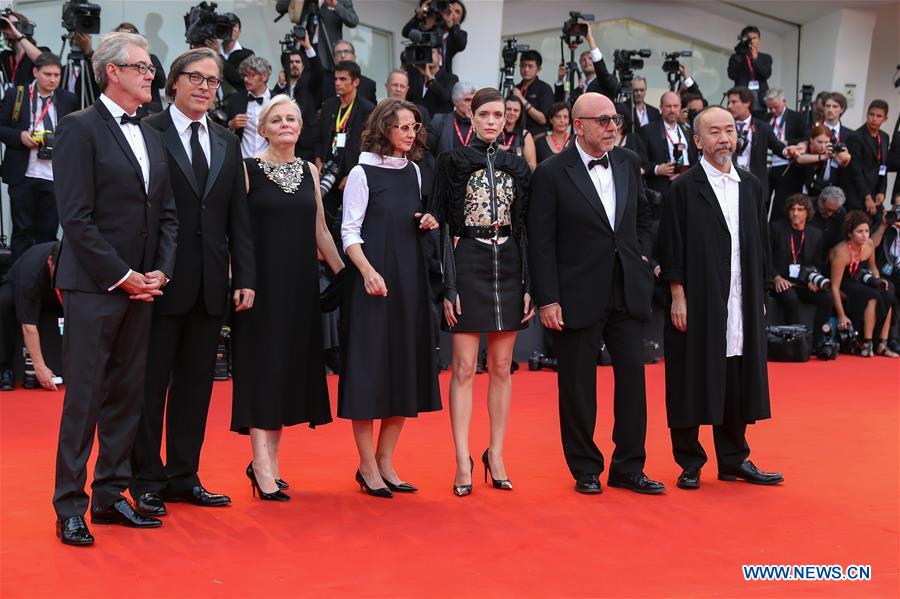
Main competition jury members pose on the red carpet of the opening ceremony of the 76th Venice International Film Festival in Venice, Italy, Aug. 28, 2019. The 76th Venice International Film Festival kicked off here on Wednesday. (Xinhua/Zhang Cheng)
VENICE, Aug. 28 (Xinhua) -- The 2019 Venice International Film Festival kicked off here at the Lido of the Italian lagoon northeast city on Wednesday, amid expectations of a high quality edition.
The rich line-up awaiting public and critics this year includes top movie stars, as well as Italian and international auteurs, and features that approach several contemporary, and often sensitive, issues.
21 films run in the 76th Venice main competition, which is accompanied by other six sections -- including Out of Competition, Horizons, Venice Classics, and Venice Virtual Reality -- and by the Giornate degli Autori (Authors' Days) as one of the independent events running alongside the festival.
"Many films competing this year deal with the big issues of our times, with a critical approach," Venice Film Festival director Alberto Barbera said.
"It seems to me cinema has re-discovered history and reality, after escaping for years in a world of fantasy and parallel universes... and I find this relevant," he added.
This year, Argentinian director Lucrecia Martel will preside the international jury tasked with awarding Venice's Golden and Silver Lions.
STARS AND STORIES
Brad Pitt, Meryl Streep, Joaquin Phoenix, Scarlett Johansson, Gong Li, Johnny Depp, Juliette Binoche, and Catherine Deneuve are among the stars to stroll on the red carpet during the eleven days of this edition running until Sept. 7.
The festival will open with the world premier of "La Verite" (The Truth) by Japanese director Kore-eda Hirokazu, and starring Catherine Deneuve, Juliette Binoche, Ethan Hawke. Set in Paris, the movie tells of a French cinema star (Deneuve) that reunites with her daughter (Binoche), after having published her memoirs.
Such memoirs will spark a confrontation between the two women, and an intense exchange of resentments, confessions, family accounts to settle, and love feelings.
Other films competing for Venice's major prize -- the Golden Lion -- include "Ad Astra" by American director James Gray, a science fiction movie starring Brad Bitt in the role of a space engineer travelling to the outer edges of the solar system to find his missing father, who had set off on a one-way journey to Neptune years before.
There is also U.S. director Todd Phillips' "Joker", which investigates the soul of Batman's famous nemesis, here played by Joaquin Phoenix.
The main selection also includes "Marriage Story" by Noah Baumbach, starring Scarlett Johansson in a delicate portrait of a married couple breaking up, and "The Perfect Candidate" by Saudi director Haifaa al-Mansour, which tells of a female Saudi doctor who challenges the patriarchal system in her country by running as a candidate in municipal council elections.
CONTROVERSY ON SCARCE FEMALE PRESENCE, POLANSKI
Al-Mansour is one of the two female directors included in the Venice FF's entries this year, along with Australian Shannon Murphy, who competes with her "Babyteeth".
The main competition further includes "J'accuse" (An Officer and a Spy) by French-Polish Roman Polanski, focused on the drama of French Capt. Alfred Dreyfus, who in 1895 was accused of spying for Germany, and sentenced to life imprisonment.
And exactly the very limited presence, again, of female directors at Venice, and the selection of the movie by controversial Polanski -- involved in a 1977 child rape case, and expelled by the Oscar's Academy in 2018 -- were two issues dominating the opening press conference on Wednesday.
"I firmly believe we have to distinguish between the artist and the man," director Barbera told reporters about Polanski's movie.
"The history of art is full of artists who committed various crimes, but we nonetheless keep admiring their pieces of work."
"I watched Polanski's movie and I liked it, therefore I invited the movie to the competition... I am a critic, not a judge, and my job ends here," he added.
The president of the jury -- Lucrecia Martel -- was less sharp in her comments, explaining she would not separate the man from the artist, but she also stressed the Polanski judicial case was very long and complex.
She admitted the presence of Polanski's film, and the news about his past, made her "a little uncomfortable", and said she would not attend the gala in favor of the French-Polish director.
However, she added, it was difficult to define the right approach towards people who committed certain acts, and were judged for those acts.
"I think these doubts are parts of the debate in our time... I will not congratulate him, but I think it is correct that his film is here at the festival," the Argentinian director said.
As for the lack of women among directors in the main selection, Barbera fended criticism off. "I would have liked to include more films directed by female artists in the competition, but this was not the case, even if our selecting committee is made for 50 percent by women," Barbera said.
He explained a festival was not the place, in his opinion, where to introduce female "quotas", since this would mean abdicating to the only criterion critics should follow, that is the quality of a film.
"The real obstacle (to a larger presence of high-quality female directors) are the difficulties women face in entering cinema schools, and in receiving funds from the financing system of the industry," he stressed.






